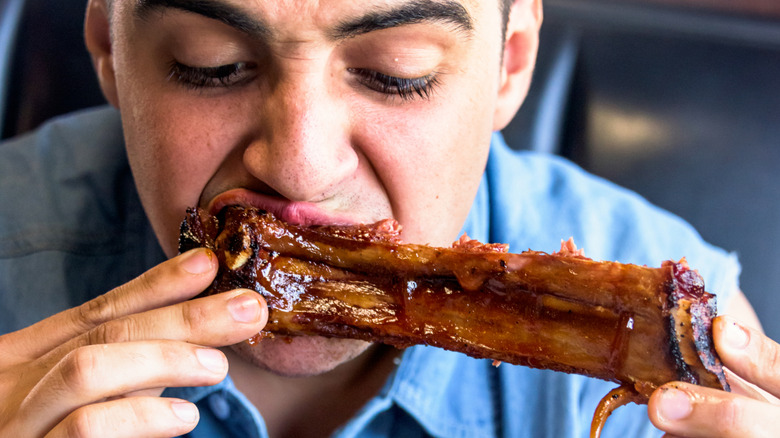Etiquette To Consider When Ordering At A Business Dinner
If you're attending a business dinner, there's a lot to be considered. Such functions are really an extension of one's work day when you boil it right down — and the same scrutiny of one's behavior can be as present as it is at the office. In terms of your comportment at such an event, it's about more than just keeping your elbows off the table (which is a rule of etiquette that has medieval origins, incidentally). There's a distinct difference between table manners and dining etiquette, and there are food and dining etiquette rules you need to stop breaking if you have some bad habits.
Navigating all of the make-or-break factors of a business dinner can be complicated and stressful, so Food Republic reached out to Salar Sheik, a restaurant consultant at Savory Hospitality, for some professional insight on how to make a good impression at a corporate dine-out. The fundamental elements of good manners are foundational in this setting and some of the first things to consider. "Ordering at a business dinner isn't just about food — it's about showing respect for the occasion and the people at the table," Sheik shared.
Following the initial chitchat with your seatmates, the first hurdle of a business dinner is making your selections and communicating them to the waiter. "Business dinners are about connection, trust, and professionalism," Sheik advised. "Ordering wisely reflects not just good dining manners but also good business sense."
Ordering with aplomb
Ordering may seem simple enough when you're dining alone or with friends. But in a professional setting, there are many ordering behaviors that can place you in a bad light. For instance, choosing the most expensive entrée on the menu "can signal poor judgment or insensitivity, especially if someone else is hosting," Salar Sheik explained. "This can signal a lack of awareness or appear as though you're taking advantage of the host."
Indecisively lingering over the menu when it's your turn to order can also make you memorable for all the wrong reasons. "Long deliberations can interrupt the flow of conversation and make the moment awkward," Sheik advised. In a similar vein, you should keep food customization to a minimum — you definitely don't want to request a host of nitpicky changes that will have your waiter exasperated and your companions raising their eyebrows. "While small adjustments are fine, excessive modifications can come across as high-maintenance," Sheik warned.
If you do legitimately need to request changes due to dietary restrictions, keep them as streamlined as possible. If you can, review the restaurant's menu beforehand so you know exactly what you want and what adjustments need to be made. Then, deliver your instructions as smoothly and concisely as possible. "A polite, straightforward explanation ('I don't eat gluten, could I have the grilled fish without the sauce?') shows professionalism," Sheik instructed. If your dietary constraints are extensive, "consider letting the server or host know privately before ordering."
Consider appearances
What you order can be just as important — sometimes more so — as how you order it. For instance, consider any potential awkwardness or sloppiness of a dish before committing to getting it. Things like crab legs, ribs, and topping-loaded hamburgers can be a mess to consume in front of others. "These take attention away from the conversation and can leave you distracted or uncomfortable," Salar Sheik cautioned.
Really pungent foods can also be distracting for your dinner companions, like garlic-forward dishes and certain smelly vegetables. You should additionally be careful about the amount of alcohol you order with dinner. "One drink is acceptable if others are drinking," Sheik stated, "but more than that risks blurring professionalism." Every corporate party seems to have "that one person" who got way too tipsy and made a spectacle of themselves — just make sure that person isn't you.
At the end of the day, remember why you attended this dinner in the first place: business. "The goal is to order something enjoyable, approachable, and easy to manage — leaving your attention free for building business relationships," Sheik recommended.



